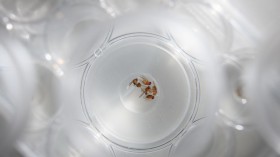The interest of fauna and farmer, trying to protect their livestock, may finally be unified by Africa's poison "apple," a toxic invasive plant that has overrun vast swaths of East African savanna and pastureland.
The "Sodom apple," which isn't even an apple at all but a relative of the eggplant, smothers native grasses with its thorny stalks, while its striking yellow fruit provides a deadly temptation to sheep and cattle.
New research suggests, however, that certain African wildlife, particularly elephants, can withstand the plant's toxic effects, and may be the answer to a symbiotic relationship with livestock.
A five-year study led by Princeton University researchers found that elephants and impalas, among other wild animals, can not only safely gorge themselves on the plant, but can efficiently regulate its otherwise explosive growth, according to a report in the journal Proceedings of the Royal Society B.
"The Holy Grail in ecology is these win-win situations where we can preserve wildlife in a way that is beneficial to human livelihoods," lead author Robert Pringle, an assistant professor of ecology and evolutionary biology, said in a statement.
The researchers set up 36 enclosures - which are designed to keep animals out rather than in - that fell within four types: one type open to all animals; another that excluded elephants; one in which elephants and impalas were excluded; and another off limits to all animals. The researchers used cameras to capture 30,000 hours of foraging activity by elephants, impalas, small-dog-sized antelopes known as dik-diks and rodents. The Sodom apple proliferated with each group of animal that was excluded.
By devouring this toxic fruit, these wild animals are preventing the plant from spreading, as well as provide less of a temptation for livestock who would succumb to the plant's toxicity.
"It's a nice example of how conservation needn't be about sacrifice. It often is - let's be honest. But there are situations where you can get a win-win," Pringle said.
Elephants and impalas can withstand Solanum campylacanthum because they belong to a class of herbivores called "browsers" that survive on woody plants and shrubs that are usually toxic.
There is a catch to the elephants' and impalas' appetite for the Sodom apple, however. They eat the fruit on one end, but its seeds come out the other, and most have the potential to germinate once again.
© 2024 NatureWorldNews.com All rights reserved. Do not reproduce without permission.





